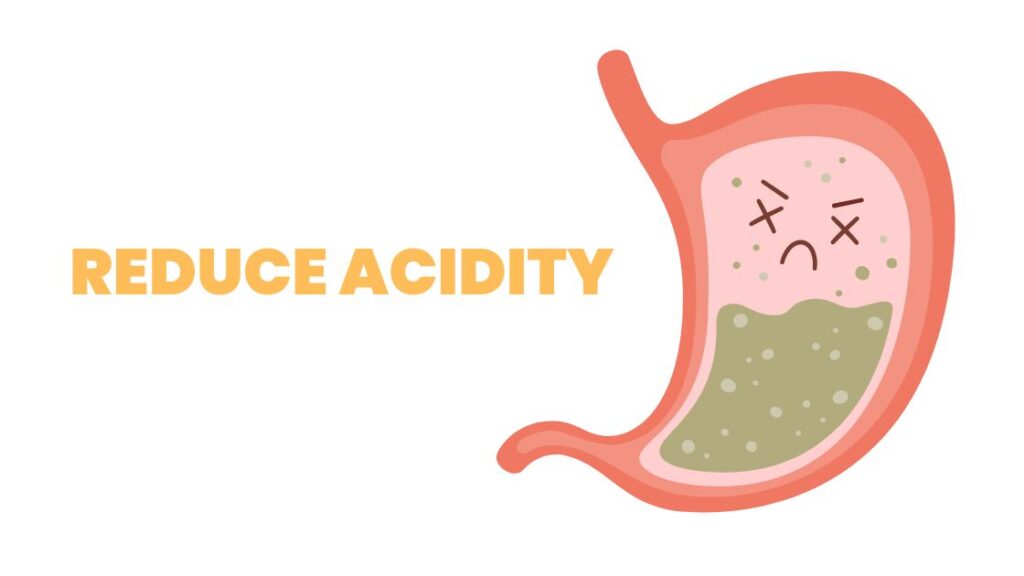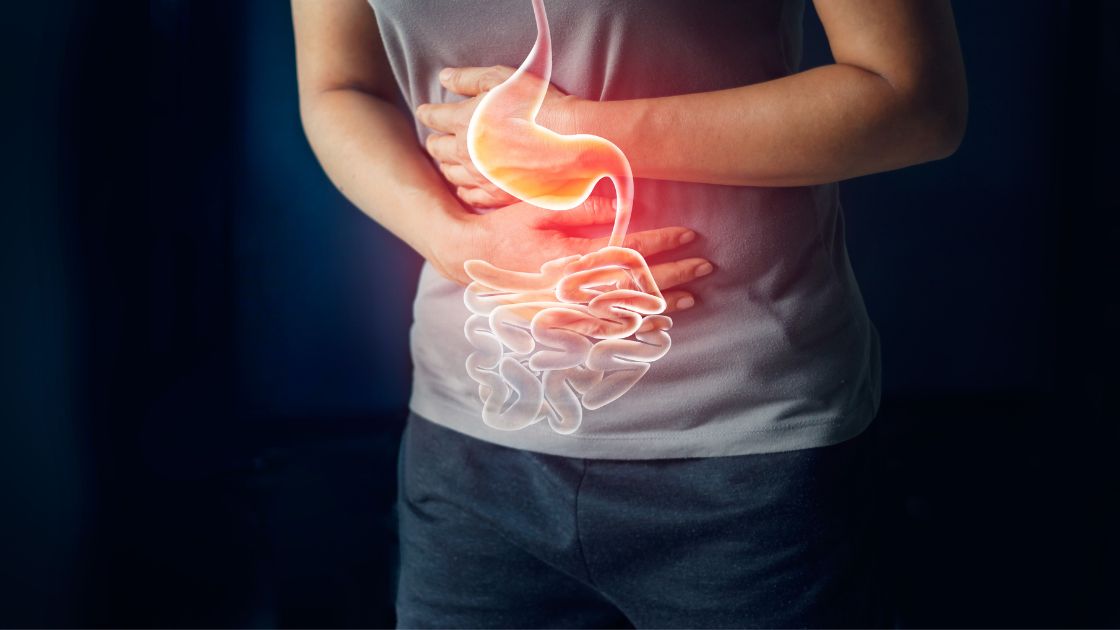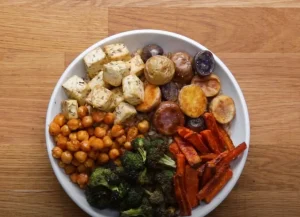Do you suffer from acidity frequently and want to avoid feeling that burning sensation?
Well, let me tell you that this is more common than you think. All people have experienced heartburn at least once in their lives.
But fortunately, it is a condition that can be reduced if the proper recommendations are followed. It is about improving eating habits and paying attention to the foods that trigger it. Keep reading and know in detail how to reduce acidity.
What is Acidity?

The amount of acid buildup in our bodies is known as acidity, heartburn, or acidosis. We must maintain a healthy pH of 7.0 or higher for our biological fluids to perform their functions effectively. Anything less than that is considered acid.
In the upper part of the stomach, there is a muscle known as the esophageal sphincter. It is responsible for regulating the opening between the esophagus and the stomach. When the esophageal sphincter does not close completely, stomach acid and food back up into the esophagus. This ailment is medically known as gastroesophageal reflux.
The term “acid reflux” refers to the acidic liquid that rises the esophagus and we feel it burning.
Hoarseness and sore throat are caused by acid in the stomach. When this happens, an unpleasant taste is left on the tongue and in the mouth. Acid reflux is known as gastroesophageal reflux disorder (GERD) when it causes persistent symptoms. Heartburn is the main sign of GERD. Upper abdominal and chest pain are potential symptoms.
You should pay attention to the acid reflux symptoms and the frequency of their occurrence. If a person has one or more of the following symptoms, it means that his body may have too much acid:
- Bone fragility/osteoporosis
- Dental problems
- Problems when trying to weight loss
- Sleeplessness or fatigue
- A growth in mucous
- Dermatopathological issues
- Muscle pain
How to prevent acidity?

Many people get discouraged and think that they cannot solve the problem. But the truth is that just by following some basic recommendations, acid reflux symptoms can be reduced. Pay attention to the following tips:
Eat little portions and frequently
There is frequently greater reflux into the esophagus when the stomach is full. To avoid this, it is best to make several food servings. This entails eating more little meals throughout the day instead of big substantial meals.
Also, eat slowly. If you eat fast you can have indigestion and consequently suffer from gastric reflux.
Don’t eat specific foods
The bland foods were advised to be avoided by those who suffered from acid reflux. However, some meals continue to be more prone to cause reflux than others. If you suffer from acid reflux, you must avoid the following foods:

- Fatty food
- Tomato
- Spicy food
- Mint
- Garlic
- Onion
- Tea
- Caffeine
- Alcohol
- Chocolates
If you consume any of those items frequently, you might want to try giving them up to reduce acid reflux.
Remain alert after eating
Gravity alone helps acid stay in place in the stomach when we are standing or sitting. If you want to go to bed, you should wait 2-3 hours after finishing your meal. This will ensure that food does not back up into your esophagus when you lie down. You should completely avoid post-lunch naps, as well as late dinners and late-night snacks.
Don’t go too quickly
After eating, wait a few hours before engaging in vigorous exercise. It is best to remain at rest while your body completes the digestion process. After-dinner walks are acceptable, but vigorous exercise, especially if it requires bending, can cause acid to enter the esophagus.
Lie down inclined
You should keep slightly inclined while you sleep. Head and feet should be about 6 to 8 inches off the bed. You can achieve this by using extra-tall bed risers or by stacking more pillows on the support legs of the bed.
For the upper body, consider using a foam wedge. Pillow stacking will occasionally not provide the constant support we need.
Lose weight
Weight gain distributes the muscles that support the lower esophageal sphincter, reducing the pressure that keeps it closed. If the sphincter can’t be kept closed, heartburn and reflux will set in.
Quit smoking

Smoking can have serious negative impacts on health, especially on the digestive system. The nicotine found in cigarettes can cause the esophageal sphincter to relax and not close completely. So if you smoke, it is recommended that you quit immediately.
Verify the prescriptions
Tricyclic antidepressants, postmenopausal estrogens, and anti-inflammatory pain relievers are some medications that relax the sphincter.
Other medications such as alendronate, ibandronate, and risedronate, which are used to increase bone density, can irritate the esophagus.
If you feel that any of the medicines you normally use are causing reflux, talk to your doctor. Additional medication may be necessary to help you avoid reflux symptoms.
Clear the clutter
Alcohol, coffee, processed foods, and sugary drinks alter the body’s natural acid balance. Our muscles and bones contain calcium and magnesium, which they can remove, making us more prone to disorders like osteoporosis.
Don’t forget to drink enough water
One of the simplest ways to balance the acid in the body is to drink more water. Our bodies can get the hydration they need from either alkaline water or ordinary water. The body will naturally remove excess acid through the digestive system if you stay hydrated.
What foods can help reduce acidity?

Cucumbers
Cucumbers have diuretic qualities by nature. They can break down uric acid naturally and expel it from the body. It maintains hydration, eliminates toxins, and also cleanses and regulates acid levels in the body.
Basil
Basil, also known as tulsi in India, is known as the queen of plants. Contains plenty of omega-3 fatty acids, calcium, and vitamins K and C. These leaves are rich in nutrients and help your body eliminate acid naturally. Its constant consumption reduces the possibility of developing kidney stones.
Almonds
Almonds are good for your overall health. They and the majority of other nuts are abundant sources of many necessary nutrients and good fats.
For this reason, they should be incorporated into the diet regularly. They enhance the health of the skin, hair, memory, and muscles, lower cholesterol levels, and slow weight loss.
Lemons
Lemons have an alkaline effect on the body that helps control acidity levels. They are citrus fruits with outstanding benefits for the digestive system. Furthermore, it is essential for raising the pH levels of the body. Drinking lukewarm water with fresh lemon juice every day helps to eliminate excess acid present in the body.
Cabbage
The immune and digestive systems benefit from the folate and magnesium in cabbage. This vegetable is also high in fiber, which helps the body stay alkaline. It can aid in weight loss and help in our body’s battle against cancer diseases.
Grapefruit
Citrus fruits like grapefruit are incredibly beneficial for health. Contrary to popular belief, grapefruits are alkaline and have metabolism-boosting qualities. Provides the body with vitamin C, which naturally strengthens the body’s immune system. In addition, it is essential to raise the alkaline levels of the body and prevent the formation of extra fat.
Melons
Another sweet and healthy fruit is melon. They are alkaline, and high in phytochemicals, beta carotene, and B vitamins. Regularly eating this fruit helps balance the pH levels in your body. The nutrients in this fruit help the body to eliminate all the toxins that have accumulated inside it.

Reduce acidity from now
You already know how to reduce acidity. With simple changes in habits, you can improve those terrible symptoms caused by gastroesophageal reflux. But to see results, you must be constant and take great care of the food you eat.
The base is in the habits that you decide to carry. You will achieve nothing by taking a drug treatment while smoking or eating junk food. If you want to see the improvement you must get away from what hurts you.

I am a professional health and nutrition writer with extensive experience in the industry. My passion for sharing valuable insights on nutrition and wellness stems from over 15 years of personal training and maintaining a healthy lifestyle. My commitment to continuously educate myself on the latest trends and research in the field allows me to deliver high-quality content that is informative and engaging. My mission is to empower individuals to make informed decisions about their health and well-being through my writing.









